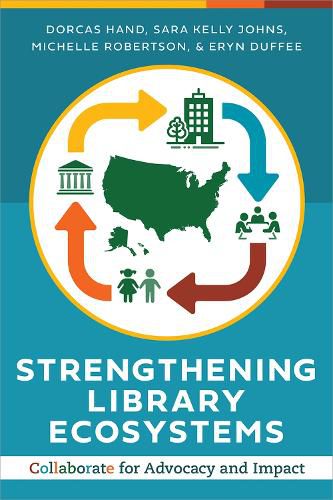Readings Newsletter
Become a Readings Member to make your shopping experience even easier.
Sign in or sign up for free!
You’re not far away from qualifying for FREE standard shipping within Australia
You’ve qualified for FREE standard shipping within Australia
The cart is loading…






This title is printed to order. This book may have been self-published. If so, we cannot guarantee the quality of the content. In the main most books will have gone through the editing process however some may not. We therefore suggest that you be aware of this before ordering this book. If in doubt check either the author or publisher’s details as we are unable to accept any returns unless they are faulty. Please contact us if you have any questions.
A patron of one library is the potential patron of any other library at a different time of life or location. And though each library serves its own unique community, when different kinds of libraries speak together with one voice, the entire library ecosystem is stronger. Distilling the work of ALA's Ecosystem Task Force, this book will guide library organizations in assessing and extending the strength of their ecosystems by identifying priorities for advocacy and legislation. Its flexible framework can apply to the library ecosystem at any level and can accommodate all types of libraries and library organizations, including friends groups and trustees, vendors, and literacy groups. In this book, readers will
learn what constitutes a library ecosystem and how diverse libraries can unite around common goals and values; see the ways in which various library types (school, public, and academic) differ and how they can better see one another as essential allies with shared values; learn the elements of ecosystem thinking, including components such as effective leadership, communication, collaboration, and sustainability for advocacy success; learn how to apply ecosystem ideas to bolster legislative advocacy and combat censorship attempts; grasp the contrasts between "going it alone," which often devolves into fragmented messaging and unfocused action at cross-purposes with other libraries, and speaking together with one voice, as illustrated through real-world examples and case studies; and get an assortment of practical tip sheets, discussion questions, points to consider, and other helpful prompts and guideposts for setting out on their own ecosystem journey.
$9.00 standard shipping within Australia
FREE standard shipping within Australia for orders over $100.00
Express & International shipping calculated at checkout
This title is printed to order. This book may have been self-published. If so, we cannot guarantee the quality of the content. In the main most books will have gone through the editing process however some may not. We therefore suggest that you be aware of this before ordering this book. If in doubt check either the author or publisher’s details as we are unable to accept any returns unless they are faulty. Please contact us if you have any questions.
A patron of one library is the potential patron of any other library at a different time of life or location. And though each library serves its own unique community, when different kinds of libraries speak together with one voice, the entire library ecosystem is stronger. Distilling the work of ALA's Ecosystem Task Force, this book will guide library organizations in assessing and extending the strength of their ecosystems by identifying priorities for advocacy and legislation. Its flexible framework can apply to the library ecosystem at any level and can accommodate all types of libraries and library organizations, including friends groups and trustees, vendors, and literacy groups. In this book, readers will
learn what constitutes a library ecosystem and how diverse libraries can unite around common goals and values; see the ways in which various library types (school, public, and academic) differ and how they can better see one another as essential allies with shared values; learn the elements of ecosystem thinking, including components such as effective leadership, communication, collaboration, and sustainability for advocacy success; learn how to apply ecosystem ideas to bolster legislative advocacy and combat censorship attempts; grasp the contrasts between "going it alone," which often devolves into fragmented messaging and unfocused action at cross-purposes with other libraries, and speaking together with one voice, as illustrated through real-world examples and case studies; and get an assortment of practical tip sheets, discussion questions, points to consider, and other helpful prompts and guideposts for setting out on their own ecosystem journey.